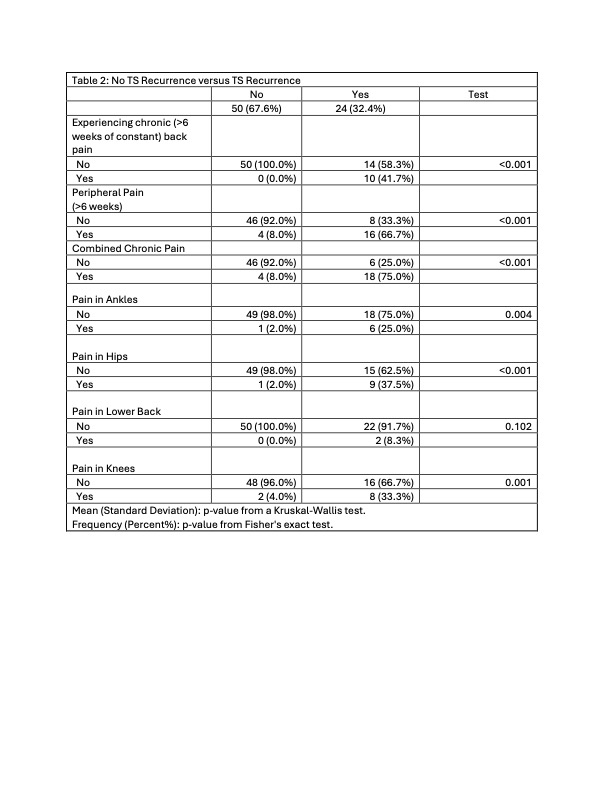Session Information
Session Type: Abstract Session
Session Time: 2:15PM-2:30PM
Background/Purpose: Transient synovitis (TS) of the hip is considered a common, self-limited condition in the pediatric population. However, recurrences can occur; these may signal an early manifestation of enthesitis-related arthritis (ERA) or Juvenile Spondylarthritis (SpA). We conducted a retrospective chart review study that identified the initial visit of all coded transient synovitis cases from 2002 to 2022 and attempted to contact these patients by telephone. The study goal was to determine, through direct interview, whether these patients had recurrent disease and subsequent clinical features indicative of early juvenile spondylarthritis (SpA) or enthesitis-related arthritis (ERA).
Methods: Data collected from the initial chart review included demographics and details from the initial ED visit. A follow-up by telephone interview obtained data on the recurrence of transient synovitis, chronic back pain (lasting > 6 weeks), joint pain, and physician diagnoses such as Enthesitis Related Arthritis, Juvenile SpA, or related conditions after obtaining consent.
Results: A Total of 184 charts were analyzed after review to determine the accurate diagnosis of transient synovitis; 74 patients (40%) were successfully contacted. The demographics and clinical features of the 74 contacted were no different from those of the 110 who were unable to be contacted. [Refer to Figure 1] One third of the contacted patients reported recurrent transient synovitis; these subjects exhibited significantly higher rates of musculoskeletal pain compared to those with non-recurrent transient synovitis. Chronic back pain was reported in 41.7% of the recurrent transient synovitis group vs. 0% of the non-recurrent group (p < 0.001). Chronic peripheral pain was present in 66.7% in the recurrent group vs. 8.0% in the non-recurrent group (OR 21.6, 95% CI: 5.3–113.0, p < 0.001). Combined chronic peripheral and back pain was present in 75.0% in the recurrent group vs. 8.0% in the non-recurrent group (OR 31.8, 95% CI: 7.5–176.9, p < 0.01). Pain localized to hips, knees, and ankles was significantly more common in recurrent cases (p < 0.005). Absence of pain was strongly associated with the non-recurrent group (92.0% vs. 33.3%, p < 0.001). [Refer to Figure 2]
Conclusion: Recurrent transient synovitis may be an early indicator of Juvenile SpA or Enthesitis Related Arthritis. In our retrospective cohort, one-third of transient synovitis cases reported recurrence of transient synovitis. Of those who reported recurrences, a substantial number of participants also indicated additional symptoms that are concerning for a developing enthesitis related arthritis or Juvenile SpA such as chronic back pain and lower extremity pain. Recurrent transient synovitis may signify an important precursor to Juvenile SpA or enthesitis related arthritis and potentially be considered a risk factor. These findings support the need for ongoing follow-up with pediatric rheumatology. A future prospective study would be necessary to establish a diagnosis of Enthesitis Related Arthritis or Juvenile SpA in individuals who experienced recurrent transient synovitis.
 Demographic comparison of Contacted vs Unable to Contacted
Demographic comparison of Contacted vs Unable to Contacted
.jpg) No TS Recurrence versus TS Recurrence
No TS Recurrence versus TS Recurrence
To cite this abstract in AMA style:
Bandu A, Cidon M, Weisman M. Is Transient Synovitis of the Hip preclinical Juvenile SpA ? A follow-up study [abstract]. Arthritis Rheumatol. 2025; 77 (suppl 9). https://acrabstracts.org/abstract/is-transient-synovitis-of-the-hip-preclinical-juvenile-spa-a-follow-up-study/. Accessed .« Back to ACR Convergence 2025
ACR Meeting Abstracts - https://acrabstracts.org/abstract/is-transient-synovitis-of-the-hip-preclinical-juvenile-spa-a-follow-up-study/
